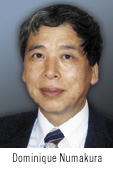
Strong foundations and diversity help others prosper.
Not long ago I predicted bad news could be expected from the Japanese flex circuit industry in July. Recently, business associates from Japan passed along detailed information about three companies related to my forecast.
Santa Light Metal, a second-tier Japanese flex circuit manufacturer, and its two subsidiaries filed for bankruptcy protection towards the end of July. During the heydays of the flex market, Santa Light Metal posted more than US$100 million in revenue. The company had laid out several expansion plans that also included its Chinese operations; however, a long-term business plan was never established, and a solid foundation for the company was never produced. Santa Light Metal did not focus on putting together a good management team, leading to a breakdown in leadership, quality control systems, efficient manufacturing productivities and advancing technologies for next generation products. They could not be competitive in an industry where predicting the next generation technology plays an integral part in profitability. Santa's only business plan to preserve market share in a shrinking market was to lower the selling price of its products. Consequently, the company has begun the legal restructuring process, but recovery could take a long time.
North Corp. also filed for bankruptcy protection in July. North was founded as an R&D and engineering company for multi-layer circuit boards and rigid/flex, and developed a unique interconnection technology that uses micro-bumps instead of a plated through hole. During North's peak, more than a dozen flex companies bought the licensing rights for this technology, and the company had more than US$20 million listed as revenue from down payments for these contracts. It became a publicly traded company and was listed in "Mothers" of the Tokyo Stock Exchange Market. Unfortunately, none of the flex manufacturers used the new technology in volume production, and North could not collect all the licensee fees. Revenue estimates declined quickly to almost zero. The company has begun the legal process to terminate the business.
Cosmo Electronics, one of the major flexible circuit manufacturers in Japan, told its customers it will close its doors and advised them to find alternative vendors as soon as possible. Cosmo was founded as the 100% subsidiary of a major material company, Toyobo. During the market boom, their business grew to more than US$100 million. The material company was not experienced in managing the circuit production business, and production efficiencies were lacking, positioning them at a competitive disadvantage. The flex market experienced two slow seasons in two years, and price reductions lead to losses in revenue and profitability. Toyobo decided to close the business and cover the huge loss rather than have its subsidiary file for bankruptcy.
There is a common thread in these companies' downfalls. They were start-ups in the flex business during the last 15 years, and experienced rapid growth as the flex market had dramatic growth. No efforts were made to establish a foundation for each business during the peak times for the industry, and their financial status began to erode year after year. The recent slowdown in demands for consumer flex products struck the final blow for these unstable companies.
Some of the other major flex manufacturers in Japan have similar issues and face the same risks in a slowing market. Fortunately, they are diverse and have sources of income from other companies, so they may be able to avoid collapse.
Headlines
Ube Industry, a major polyimide product supplier in Japan, has released another new plant plan in Sakai, Osaka. The 10th and 11th manufacturing lines of U-pilex film will be built by autumn of 2008. The 8th and 9th lines are already under the construction.
Japanese electronics company Pioneer will invest tens of billions of yen to build a new manufacturing plant of plasma display panels in Yamanashi prefecture. Construction will start in 2006 and the operation will begin in 2007.
Sumitomo Chemical has founded a new subsidiary, Sumika Electronic Materials Poland Sp. for the volume production of polarization films for LCD devices. Production for European customers will start in 2007.
Matsushita Electric Works, a major laminate supplier in Japan, will increase the selling price of relay devices by 10-20% due to increased prices of materials.
Japanese equipment manufacturer Noritake has developed a new firing farness for the casting process of the adhesiveless type flexible copper laminates. It significantly reduces processing time and energy.
Hitachi has developed a new semiconductor biosensor device for the measurement of protein contents. The new sensor can detect one order lower amount of proteins compared to traditional optical sensor devices.
Kyocera Kinseki, a device manufacturer in Japan, had 100% stakes of Hertz Corp. to strengthen the quartz device business.
Fuji Electric will invest 30 billion yen to double the manufacturing capacity of hard discs to 6 million discs per month.
Japanese PCB manufacturer Daisho Denshi will build a new manufacturing plant of IC substrates in autumn of 2006 to triple capacity in the Tochigi facility.
Yonezawa Densen, a second tier cable company in Japan, will begin volume production of porcelain substrates for LED light source modules.
Dai-Nippon Screen, a Japanese equipment manufacturer, will invest 1.5 billion yen to build a new volume production plant of the manufacturing equipment of flat panel displays.
Toppan Printing has a new strategic business alliance with AUO in Taiwan for the manufacturing and supply of LCD device color filters. PCD&M
Dominique Numakura is president of DKN Research; This email address is being protected from spambots. You need JavaScript enabled to view it..












